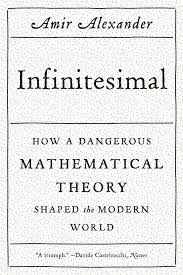Ye Olde Natural Philosophy Discussion Group
Reviews and comments on
Amir Alexander: Infinitesimal: How a Dangerous
Mathematical Theory Shaped the Modern World [2014]

This is an interesting social history of the notion of the infinitesimal, which played an important role in the development of the calculus. Most of us gave the book fairly high ratings, with our group average being a 7.4 on a scale of 0 to 10.
John said that the book is really more of a history lesson than science, but that it was “all good history”. He joked that Hobbes “really messed up”, while John Wallis was very enlightened. Overall, John said he really enjoyed the book and rated it an “8”.
Kirby also gave it an “8”. He commented that he really, really enjoyed the book in part because of its substantial religious history about the role of the Jesuits in obstructing the development of the calculus. He said that “Anyone who has a real interest in math and religious history should definitely read this book.”
Vicki, however, thought there was too much religious history in the book, which frustrated and bored her. She only read 100 pages or so and gave it a rating of “5”. Barbara said she enjoyed reading it and was really entranced by the book and the discussion of infinity. She gave it a “9”.
Ron also liked the book a lot and gave it an “8”. He felt that what could have been a quite boring book was actually made quite interesting, and thought it was great how the author tied the math together with religion and society. He found the social history aspect of the book quite innteresting.
Rose granted that the stuff about the Jesuits was interesting, but found the mathematics a little too demanding. She gave up halfway into the book and didn’t give a rating.
Kevin began his review by commenting that the Jesuits were assholes! (No one disagreed with him.) It’s basically a history story and well written, he says. The math is OK, but he’s not terribly interested in that. “I do now understand where things like the Mafia come from,” he said. He added that if the focus is supposed to be on the math it seems to be a little light on that material. But “the book does have some merit” and he rated it a “6”.
Rich, who rated it as a “7”, said that he had read less about religious history than Kirby and some others in the group, so most of that material was quite new to him. The book did tend to be somewhat repetitive, he said. But it showed “an amazing effort by the Church to control ideology in all spheres.”
Scott liked the book a lot and gave it an “8”—though he objected to the bourgeois-liberal political comments the author throws in at times (such as on pp. 177-178). In fact, the book spurred Scott to read (or reread) two other books relating to the history of the calculus in conjunction with this book: Carl Boyer’s The History of the Calculus and Its Conceptual Development (1949) and The Archimedes Codex (2007) by Reviel Netz and William Noel. The three books together complemented each other and made a more complete and satisfying package. The Boyer book is definitely the best of the three when it comes to the overall history of the development of calculus and more centrally focuses on the mathematics itself. (It is probably best to have taken a course or two in calculus before you read it, however.) But the other two books are very good on the areas they cover and on the social context of the times.
Scott adds that he, like many others in our group, did not fully know how fascistic and sinister the role of the Catholic Church had been in obstructing the advance of mathematics, and in effectively destroying most further mathematical research in Italy for a couple centuries. And Kevin is definitely right about the damned Jesuits!
Return to our complete list of books.
Return to our Science Group home page.